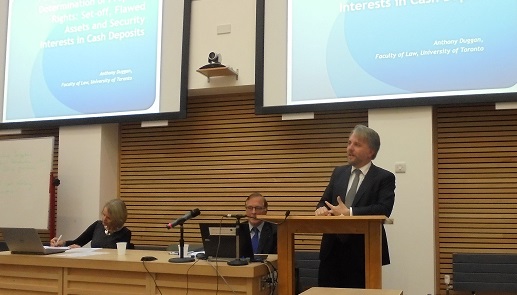4th Commercial Law Centre lecture - Form and Substance in the Determination of Property Rights
Associated people
On 14 October 2015, the Commercial Law Centre was delighted to welcome Professor Tony Duggan to present a lecture entitled 'Form and Substance in the Determination of Property Rights: Set-off, Flawed Assets and Security Interests in Cash Deposits'. Professor Duggan is a Professor and the Hon Frank H Iacobucci Chair in Capital Markets Regulation at the University of Toronto. He is presently an Academic Visitor at the Commercial Law Centre.
Professor Duggan's lecture concerned an issue which frequently vexes courts: whether a contract creates property rights, or merely personal rights. The lecture focused on the decision of the Canadian Supreme Court in Caisse Populaire Desjardins de l'Est de Drummond v Canada

That case concerned whether a bank had a proprietary or merely personal interest in funds held by a borrower on deposit. The answer to the question was critical to determining whether the bank or the tax authority had priority over the funds.
The contract between the bank and the borrower created three interests, in order to provide the bank with alternative remedies in the event of the borrower's default. Specifically, there was a flawed asset arrangement, a right of set-off, and a security interest in the funds which were held on deposit.
The Canadian Supreme Court held that the combination of set-off and a flawed asset was functionally equivalent to a charge. Accordingly, the bank had created a security interest (a proprietary interest). However, there was a strong minority dissent, concluding that merely contractual (personal) rights had been created.
Professor Duggan discussed the competing approaches: whether the arrangements ought to be assessed as a matter of form, or of substance. He also considered the broader implications of the case for the treatment of security interests Canada, and other common law jurisdictions.

Professor Robert Stevens provided comments on the lecture, including comparing the position in England. Professor Louise Gullifer chaired the discussion which followed on from the lecture and comments.
The lecture was presented live as a webinar, and many attendees from around the world watched the lecture via the webinar.
A video of the lecture and discussion is available here, together with the slides.



